- Administrator
- Albums and Singles
 When I learned of this album, it seemed like a dream come true, as I love both Nina Simone and past Xiu Xiu covers (especially "Ceremony").  Consequently, it seemed like an entire album of Jamie Stewart interpreting Nina's songs could be amazing...if I did not think too much about it.  As it turns out, it is not amazing.  It is an interesting experiment with occasionally impressive results though: Nina sounds like Jamie Stewart making an art-damaged, wildly melodramatic cabaret album with some free-jazz elements thrown in.  That is not necessarily a bad thing, but it does not bear much resemblance to either Nina Simone or classic Xiu Xiu.
When I learned of this album, it seemed like a dream come true, as I love both Nina Simone and past Xiu Xiu covers (especially "Ceremony").  Consequently, it seemed like an entire album of Jamie Stewart interpreting Nina's songs could be amazing...if I did not think too much about it.  As it turns out, it is not amazing.  It is an interesting experiment with occasionally impressive results though: Nina sounds like Jamie Stewart making an art-damaged, wildly melodramatic cabaret album with some free-jazz elements thrown in.  That is not necessarily a bad thing, but it does not bear much resemblance to either Nina Simone or classic Xiu Xiu.
While it has been several years since I have considered myself a serious Xiu Xiu fan, a project like this highlights what made me one in the first place: Jamie Stewart has always been an unpredictable and gutsy artist with great taste in influences.  Unfortunately, tackling a full album of Nina Simone songs is a fundamentally doomed endeavor, particularly when married with Stewart's current aesthetic vision.  For one, Simone's songs were great largely because she was the one singing them–not many other singers can approach her sexiness, soulfulness, intensity, or style.  The "intensity" part is not a problem for Jamie, obviously, but his hushed, quavering voice turns Nina's songs into something somewhat grotesque and Lynchian.  Equally importantly, Xiu Xiu's best work was spectacular because Stewart combined great hooks with unconventional twists and a constant sense that things were on the verge of barreling completely out of control.  On Nina, he seems intent on burying the hooks and melodies and compensating by making the surrounding music just sound a little "wrong" or "off."
Still another hurdle is that Nina is essentially a showcase for Jamie Stewart's trembling, anguished vocals and I always liked Xiu Xiu in spite of his singing rather than because of it.  While Jamie surrounded himself with an eclectic and game batch of collaborators for this project (most notably guitarist Mary Halvorson), most of these songs are very much in the "torch song" vein, so the accompaniment is generally very minimal and jazzy.  Which is a shame, because Stewart's ensemble kicks up quite a wonderful cacophony when they finally get a chance on "You'd Be So Nice" (the album's "single").  For most of the other songs, Stewart tends to be accompanied by little more than languid saxophone and some strummed jazz chords.  There are some occasional bits of guitar or sax dissonance, which are nice, but otherwise the bulk of Nina could be considered surprisingly straightforward were it not for Stewart's quivering, on-the-verge-of-a-nervous-breakdown vocals.
One final problem that I have is that most of Nina's songs were not written by Nina Simone: they were merely popularized by her.  Consequently, Stewart is basically doing radical re-interpretations of Nina's own wildly different interpretations of songs by Cole Porter, Kurt Weill, Billie Holiday, Peggy Lee, and others.  That situation is perversely exacerbated by the two Simone originals that Stewart did choose to cover: "Four Women" and "Flo Me La," as both are bizarre, highly questionably forays into cultural appropropriation.  "Flo Me La," for example, is based upon a traditional African warrior marching chant.  "Four Women," on the other hand, features Stewart singing lines such as "my skin is black" and "whose little girl am I?," which I found quite cringe-worthy coming from a white male.  Fortunately, Stewart did have the tact to avoid the line "my parents were slaves" and the clattering, lurching free-jazz accompaniment is one of the album's best moments.
All of that adds up to quite a flawed, perplexing album, but not one that I would consider a complete failure by any means.  After all, "You'd Be So Nice" is spectacular.  A whole album of this stuff is definitely numbing though.  While I have seen Nina pilloried as one of the worst albums of the year elsewhere, I found it to be just an exasperating, overlong execution of a potentially great idea (and I would much rather see Jamie gamble and fall flat than re-tread familiar territory).  If Steward had chosen some more fun songs ("Do I Move You?," for example), thought up some livelier and more adventurous arrangements, and stripped away all the more middling material, this could have been a stellar EP.  In its current state, Nina kind of resembles the work of a bumbling alchemist who transmutes gold into copper: it's definitely an interesting feat and the end result still has value, but it probably would have been better if he had just left the material alone instead.
 
 
Read More
- Administrator
- Albums and Singles
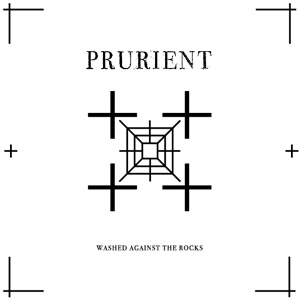 Prurient has taken a backseat in the past few years in favor of Dom Fernow's more recent high profile projects. The last major Prurient releases too were somewhat baffling: the EBM noise of Bermuda Drain and minimalist techno of Through the Window screamed out as an identity crisis compared to the harsh historical releases. This 7" is a tentative step back into the world of more abrasive, but is not quite the Prurient of the early days.
Prurient has taken a backseat in the past few years in favor of Dom Fernow's more recent high profile projects. The last major Prurient releases too were somewhat baffling: the EBM noise of Bermuda Drain and minimalist techno of Through the Window screamed out as an identity crisis compared to the harsh historical releases. This 7" is a tentative step back into the world of more abrasive, but is not quite the Prurient of the early days.
There is nary a kick drum or synth bell to be heard on these two songs, but they do retain that digital clarity of those recent works, and sits in nicely with his half of the JK Flesh collaboration from last year."Doors Closed in Secrecy" is the harshest of the pair, although does not seem that way at first.What sounds like a programmed bass synth sequence is perhaps the most musical element here, with shrill electronics bathed in reverb and indecipherable bits of voice popping in and out.
For the most part, all of the pieces of early Prurient are here, but cleaner and executed with more restraint.Later on, noise shrouded rhythmic patterns appear, and the feedback becomes aggressive enough to dissolve everything into a wall of noise that is not as far removed from his old work as I had expected.
"Washed Against The Rocks" is more ambient in comparison, initially hinging upon a simple repetitive synth pattern that could have been lifted from a Vatican Shadow song.Noise lurks beneath, occasionally flaring up in the form of distorted blasts or clattering rhythmic textures but not to the extent as on the other side.Overall it calls to mind the softer, more structured material from Pleasure Ground.
Given that Vatican Shadow and Christian Cosmos have become Fernow's projects of choice, I have wondered what the future of Prurient would be, because it seems like such a regression to just go back to his Macronympha worshipping ways.Washed Against the Rocks seems like the best direction to continue in, retaining the aggression and chaos of noise but with a more orderly and song oriented touch.
samples:
 
Read More
- Administrator
- Albums and Singles
 Mika Vainio's collaboration earlier this year with Joachim Nordwall was enjoyable, but this new release grabbed my attention immediately and did not relent for a moment. ÄÄNIPÄÄ, with Stephen O'Malley on guitar, Eyvind Kang (viola), Moriah Neils (contrabass) and Maria Scherer Wilson (cello) has more in common with Vainio's work with Pan Sonic than his recent projects, and with Alan Dubin screaming the poetry of Anna Akhmatova on two of the pieces, it surprisingly resembles a Khanate revival.
Mika Vainio's collaboration earlier this year with Joachim Nordwall was enjoyable, but this new release grabbed my attention immediately and did not relent for a moment. ÄÄNIPÄÄ, with Stephen O'Malley on guitar, Eyvind Kang (viola), Moriah Neils (contrabass) and Maria Scherer Wilson (cello) has more in common with Vainio's work with Pan Sonic than his recent projects, and with Alan Dubin screaming the poetry of Anna Akhmatova on two of the pieces, it surprisingly resembles a Khanate revival.
First paired together for a Suicide cover about five years ago, Vainio and O'Malley are very different artists, the former working mostly with clinically clean sources and the latter known for metal tinged guitar work.Through a Pre-Memory does not throw in any curve balls in that regard because both stick to what they do best, but the pairing of fractured electronic rhythms and noisy guitar works perfectly.
Opener "Muse" and closer "Watch Over Stillness/Matters Principle" are the two pieces that feature OLD/Khanate shrieker Alan Dubin and he is used to excellent effect.The former is a mix of mangled 909 kicks and snares while O’Malley's guitar mimics the rhythm with slight variations to keep it from sounding stale.Later on the proceedings become more electronic and atmospheric, with the beat dropping and scrapes of viola settling in.Dubin's screams are the same tortured, pained squeals he is known for, and when linked with the fragmented guitar bits, it does sound like Khanate.
The closing composition has the project weaving the vocals in to the mix rather than having them stand sharply in the foreground, with a tasteful amount of electronics and processing to keep them from sounding too rigid.With the stop/start nature of the mix and emphasis on beats rather than guitars, there is distinctly different feel than "Muse" had but still feels cut from the same cloth.
"Toward All Thresholds" is more of a concrete electronic piece at first, with only bits of drum or guitar popping through the otherwise complicated electronic-centric mix and only the contrabass standing out clearly as a traditional instrument.The guitar becomes more forceful, as does the rhythm, with the closing minutes having more of an industrial flair to them."Mirror of Mirror Dreams" also has ÄÄNIPÄÄ presenting drastic dichotomy, with raw feedback and electronics bouncing between more pleasant tones and the traditional instrumentation, bouncing everything between pastoral hills and post-apocalyptic wasteland.
One of the most surprising aspects of this album is that it does sound like Vainio and O'Malley jamming together.Both have become rather entrenched in the more esoteric world of musique concrete and experimental sounds, so hearing synthetic beats and overt guitar right from the start was comforting, as I am a fan of both of their most known projects.Amidst those touchstones lies a wealth of texture and sound, however, so their more abstract tendencies are never far behind.
samples:
 
Read More
- Administrator
- Albums and Singles
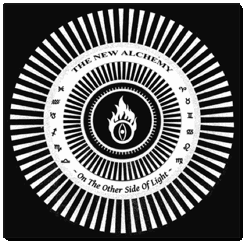 The New Alchemy creates transformational music from simple elements: voices, guitars, organs, and saxophones. The music moves deliberately, contrasting an intense, blistering, squall one might associate with screams from human sacrifice, with an airy, spacious, psychedelia.
The New Alchemy creates transformational music from simple elements: voices, guitars, organs, and saxophones. The music moves deliberately, contrasting an intense, blistering, squall one might associate with screams from human sacrifice, with an airy, spacious, psychedelia.
Per Svensson and Ebbot Lundberg share vocals, guitars, and keyboards throughout this album. Part of the charm of their vocals comes from stony repetition of phrases and some from the second-language "otherness" of their English. There are also passages of spoken word incantation which add genuine strangeness rather than unintentional hilarity. Guitars shift backwards and forwards, keyboards strike incongruent shapes, and Max Gustafsson’s saxophone at times closely resembles another fuzzed out guitar. The wildest sections are the short opening "Solar Eclipse" and the slowly evolving 24 minute closer "Extra Terrestrial Blues." Such an extended piece could easily be self-indulgent in the wrong hands but here is not a moment too long.
Between these extremes, several tracks reference very well known late 1960s psychedelia and 1970s space rock. "Creatures" resembles an energetic channeling of The Misunderstood or 13th Floor Elevators. Clay Ketter joins on drums for the title track; a stretched-out and bombastic piece with vocals that are sometimes repeated back in a slightly dumb and delirious fashion. (It reminds me of the creepy way the character of Dim in A Clockwork Orange repeats Alex's singing during the gang home-invasion scene.) "Silver Chain" has a more threatening atmosphere, including such found sound as church bells, with hints at the coming sonic, skin-blistering, wind-tunnelesque, weirdness of "Extra Terrestrial Blues."
Not that the music is doom laden or intensely dark and sludgy. Rather it is cathartic, ritualistic and invigorating. I shouldn’t be surprised if The New Alchemy take their name from Alan Watts’ 1960 essay which discusses the quest to turn base metal into gold as being more a symbol of the quest for spiritual immortality. For Watts this may have been through a chemical elixir, and less literally about eternal life than the development of consciousness outside of the restrictive realm of time. On The Other Side of Light takes a different approach to something broadly similar.
Read More
- Administrator
- Albums and Singles
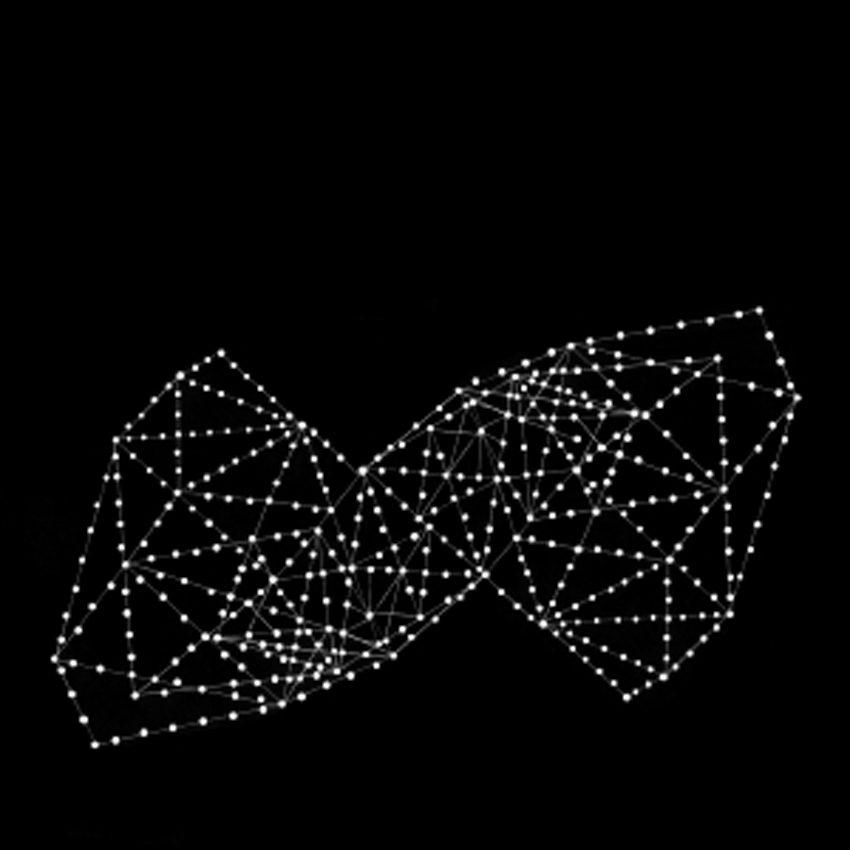 When she is at her best, Brooklyn-based experimental guitarist Sarah Lipstate is capable of creating work of almost breathtaking beauty.  On this, her debut for Important, she is at her best exactly once.  The rest of album is filled with perfectly likable, if unexceptional, forays into muted ambient soundscapes, but it is the Popul Vuh's Aguirre-meets-gnarled-guitar brilliance of the title piece that makes No Dreams an album worth hearing.  I certainly wish the rest of the album were similarly spectacular, but it feels silly to complain that Lipstate only composed one must-hear masterpiece this year.
When she is at her best, Brooklyn-based experimental guitarist Sarah Lipstate is capable of creating work of almost breathtaking beauty.  On this, her debut for Important, she is at her best exactly once.  The rest of album is filled with perfectly likable, if unexceptional, forays into muted ambient soundscapes, but it is the Popul Vuh's Aguirre-meets-gnarled-guitar brilliance of the title piece that makes No Dreams an album worth hearing.  I certainly wish the rest of the album were similarly spectacular, but it feels silly to complain that Lipstate only composed one must-hear masterpiece this year.
Several years ago, when I was still an aspiring musician, I tried to record an album that I never finished.  The problem was that every time I composed a new song, it made all of my previous songs seem comparatively inadequate, so I just kept endlessly starting over again with an increasingly unattainable baseline of quality.  The reason I bring that up is because Lipstate seems to have encountered the exact same problem with No Dreams, but solved it by just putting out everything she had anyway.  That is certainly a much more productive option than total, heartbreaking creative paralysis, but it means that No Dreams is essentially one sublime, stunning piece and a lot of vaguely pleasant (or sometimes ominous) ambient background.  "No Dreams" is not just a centerpiece or highlight; rather, it feels like the entire album's sole reason for existing.
At least, that is how it sounds at a normal volume.  When I play it loudly, No Dreams becomes significantly more compelling, as all of its many complexities and nuances come into sharper focus.  Given the proper volume and attentive listening, songs like the throbbing "Manahatta," the slow-burning, roiling "Purchase," and warmly hissing and swelling "Fighting Sleep" all sound nearly as inspired as the title track.  I guess that makes No Dreams a good headphone album and explains how it wound up as one of The New Yorker's Best Albums of 2013, but I truly wish Lipstate had not smoothed everything over into a gently pulsing and shimmering bliss-haze.  The edges and quirks are what make Noveller unique and they rarely surface here, aside from the overdriven guitar howl of "No Dreams" and a few textures amidst the creepy dissonance of "The Fright."
Ultimately, No Dreams is a curious moment in Noveller's discography, as it arguably contains the single greatest piece she has ever recorded, but otherwise feels like a transitional effort.  There are a few reasons for that, as Sarah has broadened her palette beyond guitar for the first time ever to embrace synthesizers, pianos, and muted beats.  Also, she has spent a lot of time working on soundtracks recently, which seems to have influenced her work enormously.  In fact, most of No Dreams would probably be an excellent soundtrack, as it evokes depth and mood without ever demanding my full attention.  That is not what I want from a Noveller album though.  No Dreams is like going to a renowned steak house and getting a salad–it might be a very good salad, but it kind of defeats the whole purpose of going there.  Stone-cold masterpiece title track and compositional evolution aside, I would have liked this album much, much more if it had been more forcefully and uniquely "Sarah Lipstate."
Samples:
 
Read More
- Administrator
- Albums and Singles
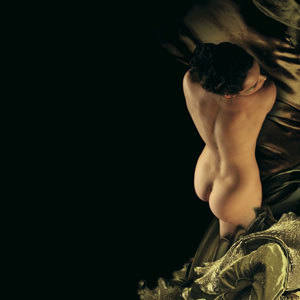 Following the recent lavish 7.10.12 box, the enigmatic :zoviet*france: have complied another release, albeit in a more conventional package, that continues the style of that set. Lush synthesizers, infrequent and erratic rhythms, and mysterious ambiences that shift from the delicate to the demonic make for another brilliant work in their long career.
Following the recent lavish 7.10.12 box, the enigmatic :zoviet*france: have complied another release, albeit in a more conventional package, that continues the style of that set. Lush synthesizers, infrequent and erratic rhythms, and mysterious ambiences that shift from the delicate to the demonic make for another brilliant work in their long career.
This material is part of a score for the dance production Designer Body, in which seven dancers slowly remove their costumes as they stand on rotating platforms.This slow deconstruction from the most unnatural and decorated costuming to literal nudity is reflected in the music here, with the pieces building up and coming apart, all presented in a rotating and circular structure.
Also shifting quite a bit is the mood and atmosphere throughout, from terror to beauty.The massive subterranean rumble of "Moss Balls on Moss" has the band building to a frightening overdriven roar as robotic sounds and noisy loops darken the mood even more.The other extreme is "Amber Rose Hand," which features a similar bass drone, but melodic keyboard passages and what resembles a melody from an ancient music box ending on a placid, beautiful coda.
This parity continues throughout, and often defies first impressions from the instrumentation.For example, the brooding harpsichord sound that appears in "Green Air" would at first seem to lead to something much darker, but with the fragmented reversed bell tones and overall lighter sound, it makes for a rather sunny composition.Such levity is not apparent in "Sweeping Arbor Low," which instead has static laden layers of electronics and swelling bass, which is comparatively amusical.
Other pieces are not as polarized but instead transition between moods and atmospheres, akin to the performance they were composed for.The beginning parts of "Flam," with skittering synth patterns and deep bass mixed with sputtering bits of music are not too far removed from late 1990s minimal techno.However, the song builds and changes via processed and mangled sounds to become a mutated acoustic strings composition at the end.
The Tables Are Turning is one of those uncommon albums that wildly diverge in sound and mood from song to song, and sometimes within a single piece, yet still comes together as a consistent whole.Electronics that are comforting and then menacing; gentle chiming tones that become shrill and sharp as a scalpel, and always sounding like a perfect pairing.Even this far into their career, :zoviet*france: continues to be untouchable and unclassifiable in a field mired with poor knock-offs and weak pretenders.
samples:
 
Read More
- Administrator
- Albums and Singles
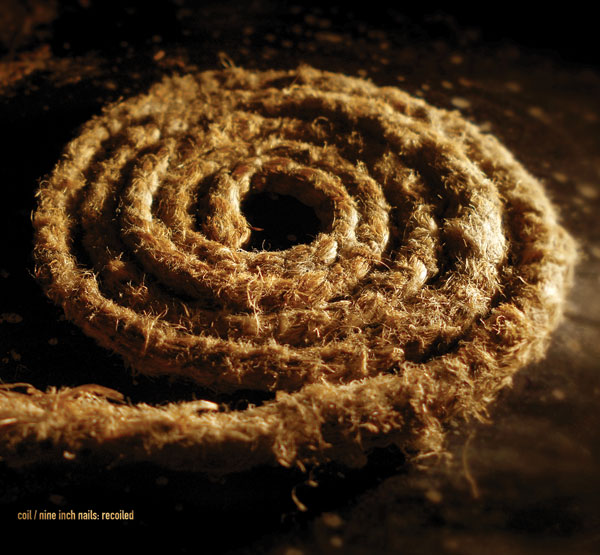
Artist: Coil / Nine Inch Nails
Title: Recoiled
Catalogue No: CSR193CD / Barcode: 5060174956799
Catalogue No: CSR193LP / Barcode: 5060174956805
Format: CD in digipak / Ltd LP on coloured vinyl
Genre: Industrial / Experimental
Shipping: 23rd January
“Recoiled” is a rambunctious alchemy, of magikal Coil sensibilities and hi-tech home circa 90’s mixing technique, all fused in the cave-like early studios of Danny Hyde / Peter Christopherson. These were the unrestrained PRE- BIG studio- mix downs, of four songs which long time Coil admirer / collaborator Trent Reznor requested Coil to remix. Reznor sent over the original multi-tracks and DATs to Hyde / Christopherson, who independently mixed versions and then met to synch both creations, molding them into these master versions. ”Recoiled” includes a fuller, more opulent version of the track ‘Closer’, which eventually made it onto the opening credits to the movie “SE7EN“. These 5 lengthy compositions are pre-Ableton / laptop generation type priest song creations, with the use of baby alarms and numerous wires to create bespoke effects. These legendary tracks were always rumoured to exist and, only the due diligence of a dedicated NIN forum who hunted them down, are released/unleashed for your listening pleasure. 4 of the tracks were released on the download-only “Uncoiled”. A bonus, previously unheard track from the same sessions closes the album. Jhonn Balance is also manifest on this gilded constellation. Beautifully remastered for CD / vinyl. CD in digipak.
Read More
- Administrator
- Albums and Singles

Artist: Psychic TV
Title: Live At Thee Marquee
Catalogue No: CSR189CD
Barcode: 5060174956768
Format: CD in jewelcase
Genre: Industrial / Esoteric
Shipping: Now
PSYCHIC TV’s complete, unheard show, recorded at the prestigious Marquee Club, London, 20th May 1986. For this event Psychic TV were: Genesis P-Orridge, Alex Fergusson, Mouse, Matthew Best. Ltd x 1000 copies, featuring an 8-page booklet of unseen photos.
Tracks: 1. Intro / 2. Ov Power / 3. She Touched Me / 4. Just Like Arcadia / 5. Supermale / 6. I Like You / 7. Riot In Thee Eye / 8. Interstellar Overdrive / 9. Unclean / 10. Godstar / 11. We Kiss / 12. Roman P. / 13. IT
Read More
- Administrator
- Albums and Singles

Artist: Psychic TV
Title: Thee Fabulous Feast Ov Flowering Light
Catalogue No: CSR188CD
Barcode: 5060174956751
Format: CD in jewelcase
Genre: Industrial / Esoteric
Shipping: Now
PSYCHIC TV in a unique line-up – a unique show, recorded 19th May 1985 at Hammersmith Palais, London. For this event Psychic TV were: Genesis P-Orridge, Alex Fergusson, Max Prior, Mouse, Hilmar Örn Hilmarsson, Dave Ball (Soft Cell), Rose McDowall (Strawberry Switchblade, Sorrow, Coil, Current 93). This is a completely unheard show, with unseen photos! Ltd x 1000 copies.
Tracks: 1. Intro, 2. I Like You, 3. Just Like Arcadia, 4. Godstar, 5. Roman P., 6. Unclean, 7. Baby's Gone Away, 8. Southern Comfort, 9. We Kiss, 10. Thee Starlit Mire, 11. Ov Power.
Read More
- Administrator
- Albums and Singles

Artist: Psychic TV
Title: Hacienda
Catalogue No: CSR187CD
Barcode: 5060174956744
Format: CD in jewelcase
Genre: Industrial / Esoteric
Shipping: Now
PSYCHIC TV, 5th November 1984, Manchester. This was PSYCHIC TV’s first show at NEW ORDER / FACTORY’s legendary HACIENDA club! For this event Psychic TV were: Genesis P-Orridge, John Gosling (Zos Kia, Coil), Paul Reeson, and Alex Fergusson. This is the complete show with unseen photos! Ltd x 1000 copies.
Tracks: 1. Intro / 2. Enochian Calls / 3. I Like You / 4. Unclean Monks / 5. Unclean / 6. Roman P. / 7. Southern Comfort / 8. Godstar / 9. Thee Starlit Mire / 10. Thee Shining
Read More
- Administrator
- Albums and Singles

Artist: Tunnels Of Ah
Title: Lost Corridors
Catalogue No: CSR184CD
Barcode: 5060174955433
Format: CD in jewelcase
Genre: Industrial / Esoteric
Shipping: Now
Tunnels Of Ah is the new project of former Head of David vocalist Stephen Ah Burroughs. “Lost Corridors” is the first Tunnels Of Ah release and features Burroughs’ “industrial esoterica”, evoking the spirit of the pioneering underground experimental scene in the new dark age. This is psychick war.
A mandatory release for those who worship at the altars of Coil, Psychic TV, Arktau Eos, Z’EV…
Tracks: 1. From A Cracked Hive (Black Insect Laughter) / 2. The Nightjar Sang A Kalpa Blaze / 3. A Net Of Woven Starlight
4. Nightfall At The Mount Of Husks / 5. Harvest Flame The Christ Force / 6. Shattering The Black Crone / 7. Crush The Heads Of Scorpions
Read More

